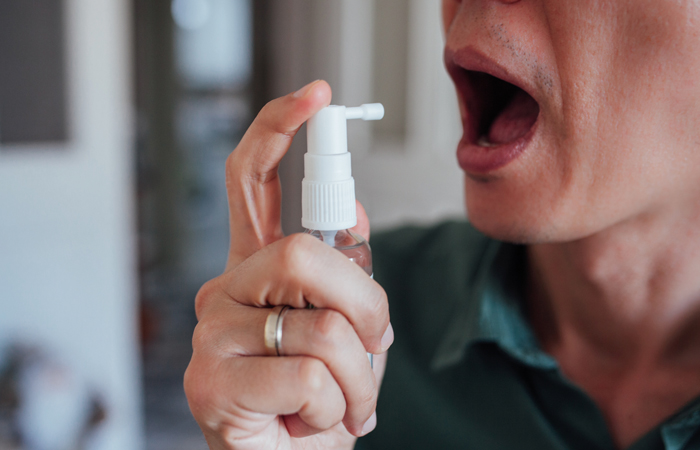Treatment options
Most sore throats, while uncomfortable, are short-lived and will usually resolve within a week. As with any minor ailment, there is much that sufferers can do themselves to relieve their symptoms. And there are many OTC products available that may also help.
OTC products
- Simple painkillers such as paracetamol or ibuprofen can help ease discomfort and reduce a fever.
- Local analgesics – for example, flurbiprofen lozenges (e.g. Strefen Lozenges) and products containing benzydamine for gargling or rinsing (e.g. Difflam), can help to ease a sore throat.
- Aspirin dissolved in water and used as a gargle is also popular, but can cause side effects such as stomach irritation, and is not recommended in many circumstances so check with the pharmacist if anyone asks about this.
- Pastilles and lozenges usually contain soothing ingredients like lemon and honey and can help relieve irritation and stop the throat feeling dry. Examples include Difflam, Strepsils Honey and Lemon.
- Antiseptic lozenges containing ingredients such as benzlkonium, dichlorobenzyl alcohol, hexylrescorcinol and tyrothricin help to fight any bacteria that may be present, e.g. Beechams Sore Throat Lozenges or Tyrozets.
- Local anaesthetics such as benzocaine in the form of lozenges and throat sprays can help to ease pain and difficulty swallowing. They should not be used for more than five days. Examples: Ultra Chloraseptic Anaesthetic Throat Spray. A local anaesthetic can also be combined with an antiseptic to fight infection and help numb the pain at the same time, e.g. Covonia Throat Spray.
Important!
Antibiotics are sometimes hailed as the solution for a sore throat but given that the vast majority of cases are caused by viral infections, they will frequently be ineffective. They do, however, have a place in the management of individuals who are at increased risk of developing a severe infection, such as those on immunosuppressant medication, or people who suffer recurrent infections that are believed to be caused by Streptococcus bacteria.
In some situations, a “delayed prescription” may be provided, whereby an individual is advised to wait a few days and only get the antibiotics dispensed if their symptoms worsen or do not improve. This approach has been shown to reduce unnecessary antibiotic use – and therefore help prevent resistance – while providing similar benefits to an immediate supply of the drug.
Self care tips
Suggest the following tips to help ease a sore throat:
- Drink plenty of fluids as this will keep the throat lubricated and prevent dehydration if the body temperature is raised
- Gargle regularly with salt dissolved in warm water to help reduce swelling and ease pain (adults only)
- Suck ice cubes, lollies or hard sweets to encourage saliva production and keep the throat moist. Children shouldn’t be given anything too small because of the risk of choking
- Avoid smoking and smoky environments
- Avoid very hot food and drink as these can cause irritation
- Get plenty of rest.
Signposting
For more information, you can:
- Use your Counter Intelligence Plus training guide
- Visit the NHS website
- Look at information provided by the charity ENT UK.


